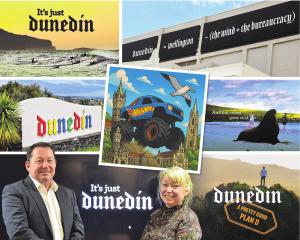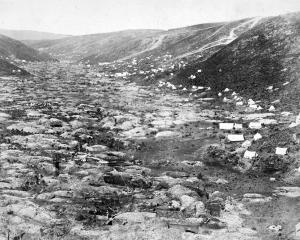Forget the rugby for a minute, they suggest. Take a look at New Zealand's badminton team going to this year's Commonwealth Games in India. Half of it comes from Southland.
That is to say - James Eunson (20) and Anna Rankin (21).
From the province where every glass is half full, the Otago Daily Times this week managed to extract the formula for how the wonderful cycling velodrome, the magnificent Southern Sting, the plucky Southland Stags and half a national badminton team came to be.
And, here it is ... revealed - the recipe for the simmering Southland stew of sporting success.
- Take 93,000 Southlanders.
- From each, extract a little pokie money and a little drinking money (the magic ingredient).
- Add a dollop of administration and a sprinkle of sporting talent.
- Stir in generous proportions of coaching time.
- Add handfuls of Southland parochialism.
- Allow to ferment, and garnish with volunteers.
- Best served at home on a cold, wet surface.
There are variations on this recipe, of course, and badminton success is but one.
Former New Zealand badminton rep Nigel Skelt runs Stadium Southland and considers getting two "youngsters" to the Commonwealth Games was "pretty significant" and only happened because Southland can back its own talent with its own money.
"Those kids, I can tell you ... would never have got away to the Commonwealth Games without that funding.
"They're a classic example of coming through a minor sport programme with really great community backing."
The funding - that magic ingredient - he and others speak so admiringly of is the $10 million or so each year the Invercargill Licensing Trust pours back into the community from gambling ($7 million) and sales of food, drink and accommodation ($3.4 million).
Such largesse has earned the trust much credit in the past 10 years for such things as Stadium Southland, the country's only indoor velodrome, a new hockey turf, covered bowling greens, improved cricket pitches, a new stand at Rugby Park and of course the campaigns that got the Stags the Ranfurly Shield at the end of last season, the Southern Steel into the playoffs in this year's ANZ netball championships and the Southland Sharks' nine wins in its first season in the National Basketball League.
And, there's one more thing to say about badminton.
Not only has ILT money allowed two young players to travel and play internationally, it is also paying the wages of high-performance badminton coach Thana Arikrishnan who moved to Invercargill from Malaysia two years ago.
Mr Skelt says having an international coach benefits not only badminton players but also coaches of other codes.
"When we do professional development, all the coaches get together so it's about the growth of coaches."
The ILT was born in 1944 when thirsty soldiers returning from World War 2 brought an end to prohibition.
However, a committee of citizens persuaded the Government that rather than allow private operators in, it should give the specially formed Invercargill Licensing Trust a monopoly on liquor sales.
Former trust chairman and All Black triallist Ray Harper was around when the trust was formed.
"There were so many bloody people against it. I remember Frank Holloway writing in one of the bloody books we had here `it'll be your gold mine of the future. Don't give it away'.
"And we've held onto it and now it is a bloody gold mine."
Trust chief executive Greg Mulvey says today the trust's monopoly - or "preferential trading rights" - applies only to sales of alcohol through hotels and taverns and off-licences.
So, he says, clubs, cafes and restaurants can have licences but supermarkets "can't sell grog".
As well as controlling the sale of "grog", the trust also controls the distribution of profits from the pokies in its establishments.
These profits are distributed separately through the trust's "foundation", and the ILT claims the foundation returns 60% or more to the community compared with the national average of 54%.
The big point of difference however, is that all the profits of Southland gambling go back into Southland while for gaming trusts in other areas there is no requirement for profits to be spent where the money is gambled.
So, with a big bag of money and nowhere else to spend it but in Invercargill, the ILT has a great ability to get things done.
Take basketball.
While the Otago Nuggets struggle for money and a single win, Southland's new boys breezed through their first year in the national league, winning half their 18 regular-season games.
ILT chairman Alan Dennis: "We took a punt this last year putting a significant amount of money into the basketball franchise and they finished midfield."
Now a Southland academy of sport is being talked of, softball has a $4 million project on the go, the Teretonga Park motor racing circuit is looking at a complete remodel, facilities for night trots are in the wind and the museum and art gallery have a $25 million project they are trying to "get across the line".
And, all will be looking to the trust.
Mr Dennis talks about getting "bangs for bucks" from a team approach that includes the ILT, the Southern Community Trust and the Invercargill City Council, which come together "at the drop of a hat" to discuss a project.
"You don't have to have a whole lot of bureaucracy involved.
"I think it's one of the things I enjoy about it most, coming out of 40 years of education which has so many overlapping layers of bureaucracy ...
"It's refreshing where you can actually make decisions and you've got the [wherewithal] to actually see things through.
"Obviously there's a few knockers but we have huge support down here and I just don't know how Invercargill would have survived, especially over the last 10 years, without having that (the ILT) as an important asset."
Such is his enthusiasm, it makes you wonder why Dunedin does not have one.
The mechanism to create a licensing trust certainly still exists.
Section 185 of the Sale of Liquor Act 1989 provides for the Governor-General, on the advice of the minister, to "constitute a licensing trust in respect of any area that is not included ... in the district of any other licensing trust".
And, while the minister retains the discretion over constituting a licensing trust, the minister "shall advise the constitution of a licensing trust for any area on the written request of at least 15% of the residents of the area, being persons qualified to vote in local authority elections".
Some of the last additions to the list were Waitakere, Wellington South, Portage and Flaxmere. But since 1975, Section 185 has been gathering dust.
Messrs Mulvey and Dennis say they have been asked many times about how a licensing trust might be established in a non-trust city.
They both believe it would be a difficult exercise given the number of privately held liquor licences.
Mr Mulvey: "All those people that have a tavern licence or a hotel licence would have to sell it, relinquish it, dispose of it in some way, or sell it to the newly created licensing trust.
"That in itself would create major problems.
"And who would be willing to take that on? I don't know.
"It is legally possible but practically, I would say it would be extremely difficult."
Mr Dennis: "I think it's something that could be lobbied but you could imagine in a place like Dunedin it would get enormous opposition because you've got the supermarkets (selling alcohol)".
The supermarkets have been active, at times, in trying to erase the monopoly of licensing trusts.
They have succeeded in places; they failed with Gore's Mataura Licensing Trust in 2001; but the threat is ever present.
The ILT's greatest weapon to fend off challengers to its monopoly seems to be public relations and every ILT staff or board member is armed with compelling arguments about the ILT's value to the community.
Mr Mulvey: "It was soccer's turn this past year. We put well over $1 million into the new soccer facilities; cricket $1.5 million, hockey. But it goes miles beyond sport ..."
Yes, unlike any other city or town in the world, every classroom in every school in Invercargill has an interactive whiteboard - courtesy of the trust and its drinkers and gamblers.
Every primary school child gets free transport to, free entry to and free tuition in the ILT-funded swimming pool.
And, the Southland Rugby Union gets $750,000 each year from the ILT.
While about half of it (the gambling money) can only be spent on the amateur game, the rest can be spent on professional players like those who will line up against Otago this afternoon.
Mr Mulvey says the money must still be used in a way that is "beneficial to the wider community".
And who can argue that holding the Ranfurly Shield is not of benefit to all Southlanders.
Mr Mulvey describes it as 'the classic case".
"It's the feel-good factor. It's the promotion of the region. It's people's enjoyment, quite frankly. It's the families that get along to the game and support the Stags rugby team ..."
So, just a reminder to those brave Otago fans who venture into Southland today and then head off for a beer afterwards - the more they drink, the more they add to Southland's sporting goldmine.
Trust is the key
The Invercargill Licensing Trust has the advantage over most of the country's other 28 trusts in that it holds a monopoly over the main forms of liquor trading - pubs and off-licences.
Over the years, South Otago, Oamaru and Ashburton residents have opened up their trusts to competition - allowing supermarkets, for instance, to stock liquor.
The Oamaru trust, which extends to Waitati in the south and to Pukeuri in the north, has gradually sold off assets in smaller towns such as Waikouaiti and Palmerston.
It returns about $100,000 to the community annually - mostly from gaming profits.
Oamaru trust member Ali Brosnan says there has been some talk in Oamaru about how the town might regain the monopoly enjoyed by the Invercargill trust.












